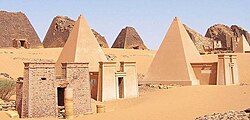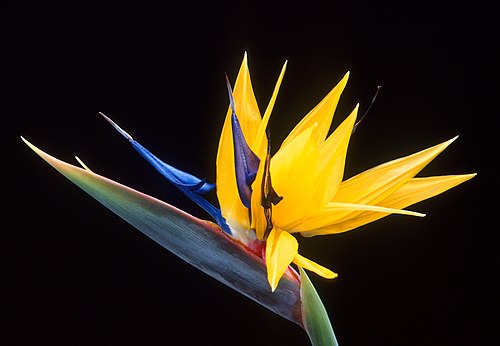Portal:Africa



Africa is the world's second-largest and second-most populous continent after Asia. At about 30.3 million km2 (11.7 million square miles) including adjacent islands, it covers 20% of Earth's land area and 6% of its total surface area. With nearly 1.4 billion people as of 2021, it accounts for about 18% of the world's human population. Africa's population is the youngest among all the continents; the median age in 2012 was 19.7, when the worldwide median age was 30.4. Based on 2024 projections, Africa's population will exceed 3.8 billion people by 2100. Africa is the least wealthy inhabited continent per capita and second-least wealthy by total wealth, ahead of Oceania. Scholars have attributed this to different factors including geography, climate, corruption, colonialism, the Cold War, and neocolonialism. Despite this low concentration of wealth, recent economic expansion and a large and young population make Africa an important economic market in the broader global context, and Africa has a large quantity of natural resources.
Africa is highly biodiverse; it is the continent with the largest number of megafauna species, as it was least affected by the extinction of the Pleistocene megafauna. However, Africa is also heavily affected by a wide range of environmental issues, including desertification, deforestation, water scarcity, and pollution. These entrenched environmental concerns are expected to worsen as climate change impacts Africa. The UN Intergovernmental Panel on Climate Change has identified Africa as the continent most vulnerable to climate change.
The history of Africa is long, complex, and varied, and has often been under-appreciated by the global historical community. In African societies the oral word is revered, and they have generally recorded their history via oral tradition, which has led anthropologists to term them "oral civilisations", contrasted with "literate civilisations" which pride the written word. African culture is rich and diverse both within and between the continent's regions, encompassing art, cuisine, music and dance, religion, and dress.
Africa, particularly Eastern Africa, is widely accepted to be the place of origin of humans and the Hominidae clade, also known as the great apes. The earliest hominids and their ancestors have been dated to around 7 million years ago, and Homo sapiens (modern human) are believed to have originated in Africa 350,000 to 260,000 years ago. In the 4th and 3rd millennia BCE Ancient Egypt, Kerma, Punt, and the Tichitt Tradition emerged in North, East and West Africa, while from 3000 BCE to 500 CE the Bantu expansion swept from modern-day Cameroon through Central, East, and Southern Africa, displacing or absorbing groups such as the Khoisan and Pygmies. Some African empires include Wagadu, Mali, Songhai, Sokoto, Ife, Benin, Asante, the Fatimids, Almoravids, Almohads, Ayyubids, Mamluks, Kongo, Mwene Muji, Luba, Lunda, Kitara, Aksum, Ethiopia, Adal, Ajuran, Kilwa, Sakalava, Imerina, Maravi, Mutapa, Rozvi, Mthwakazi, and Zulu. Despite the predominance of states, many societies were heterarchical and stateless. Slave trades created various diasporas, especially in the Americas. From the late 19th century to early 20th century, driven by the Second Industrial Revolution, most of Africa was rapidly conquered and colonised by European nations, save for Ethiopia and Liberia. European rule had significant impacts on Africa's societies, and colonies were maintained for the purpose of economic exploitation and extraction of natural resources. Most present states emerged from a process of decolonisation following World War II, and established the Organisation of African Unity in 1963, the predecessor to the African Union. The nascent countries decided to keep their colonial borders, with traditional power structures used in governance to varying degrees. (Full article...)
Selected article –
Meroë (/ˈmɛroʊiː/; also spelled Meroe; Meroitic: Medewi; Arabic: مرواه, romanized: Meruwah and مروي, Meruwi; Ancient Greek: Μερόη, romanized: Meróē) was an ancient city on the east bank of the Nile about 6 km north-east of the Kabushiya station near Shendi, Sudan, approximately 200 km north-east of Khartoum. Near the site is a group of villages called Bagrawiyah (Arabic: البجراوية). This city was the capital of the Kingdom of Kush for several centuries from around 590 BC, until its collapse in the 4th century AD. The Kushitic Kingdom of Meroë gave its name to the "Island of Meroë", which was the modern region of Butana, a region bounded by the Nile (from the Atbarah River to Khartoum), the Atbarah and the Blue Nile.
The city of Meroë was on the edge of Butana. There were two other Meroitic cities in Butana: Musawwarat es-Sufra and Naqa. The first of these sites was given the name Meroë by the Persian king Cambyses, in honor of his sister who was called by that name. The city had originally borne the ancient appellation Saba, named after the country's original founder. The eponym Saba, or Seba, is named for one of the sons of Cush (see Genesis 10:7). The presence of numerous Meroitic sites within the western Butana region and on the border of Butana proper is significant to the settlement of the core of the developed region. The orientation of these settlements exhibit the exercise of state power over subsistence production. (Full article...)
Featured pictures –
Did you know (auto-generated) -

- ... that enrollment at a school for African-American students in Virginia grew from 14 pupils to 1,300 in its first ten years?
- ... that Malaysian businessman Lim Kok Wing was depicted as "King of Africa"?
- ... that Kenyan coffee farmer "Pinkie" Jackson amassed Africa's largest collection of native butterflies?
- ... that Mary Jane Patterson, whose mother was an African-American slave, gained a BA degree in 1862 having taken a "gentleman's course"?
- ... that Michigan defensive end Eyabi Okie, ranked number 3 in the 2018 college football recruiting class, changed his surname from "Anoma" to recognize his mother who lives in Africa?
- ... that on February 3, 1986, African Independence Party leaders Adama Touré and Adama Touré were released from detention?
Categories
Selected biography –
Hakeem Abdul Olajuwon (/hʌˈkɪm/ /əˈlaɪʒu.ɒn/ huh-KEEM ə-LY-zhoo-on; Yoruba: [olaɟuwɔ̃]; born January 21, 1963), nicknamed "the Dream", is a Nigerian-American former professional basketball player. From 1984 to 2002, he played center in the National Basketball Association (NBA) for the Houston Rockets, and in his last season, the Toronto Raptors. He led the Rockets to back-to-back NBA championships in 1994 and 1995. Olajuwon was inducted into the Naismith Memorial Basketball Hall of Fame in 2008 and the FIBA Hall of Fame in 2016. He is widely considered to be one of the greatest[under discussion] centers of all time.
Born in Lagos, Nigeria, Olajuwon traveled from his home country to play for the University of Houston under head coach Guy Lewis. His college career for the Cougars included three trips to the Final Four. Olajuwon was drafted by the Houston Rockets with the first overall selection of the 1984 NBA draft, a draft well known for its immense talent, which also included players such as Michael Jordan, Charles Barkley, and John Stockton. He combined with the 7-foot-4-inch (224 cm) Ralph Sampson to form a duo dubbed the "Twin Towers". The two led the Rockets to the 1986 NBA Finals, where they lost in six games to the Boston Celtics. After Sampson was traded to the Golden State Warriors in 1988, Olajuwon became the Rockets' undisputed leader. He led the league in rebounding twice (1989, 1990) and blocks three times (1990, 1991, 1993). (Full article...)
Selected country –
 |
 |
|

| ||
Tunisia (Arabic: تونس Tūnis), officially the Tunisian Republic (الجمهورية التونسية), is a country situated on the Mediterranean coast of North Africa. It is the northernmost African country and the smallest of the nations situated along the Atlas Mountains. Around forty percent of the country is composed of the Sahara desert, with much of the remainder consisting of particularly fertile soil, and a 1300 km coastline.
Tunisia is a republic with a strong presidential system dominated by a single political party. President Zine El Abidine Ben Ali has been in office since 1987, the year he deposed Habib Bourguiba in a bloodless coup. The ruling party, the Democratic Constitutional Rally (RCD), was the sole legal party for 25 years, known previously as the Socialist Destourian Party (PSD). The RCD still dominates political life.
The majority (98%) of modern Tunisians are Arab, and are speakers of Tunisian Arabic. There is also a small population of Berbers, located in the Jabal Dahar mountains and on the island of Jerba, and Jews. (Read more...)
Selected city –
Casablanca (Arabic: الدار البيضاء, romanized: al-Dār al-Bayḍāʾ, lit. 'the White House', IPA: [adˈdaːru ɫbajdˤaːʔ]) is the largest city in Morocco and the country's economic and business centre. Located on the Atlantic coast of the Chaouia plain in the central-western part of Morocco, the city has a population of about 3.22 million in the urban area, and over 4.27 million in Greater Casablanca, making it the most populous city in the Maghreb region, and the eighth-largest in the Arab world.
Casablanca is Morocco's chief port, with the Port of Casablanca being one of the largest artificial ports in Africa, and the third-largest port in North Africa, after Tanger-Med (40 km (25 mi) east of Tangier) and Port Said. Casablanca also hosts the primary naval base for the Royal Moroccan Navy. (Full article...)
In the news
- 1 May 2025 –
- The bodies of three South African police officers who had been missing for six days are found in the Hennops River. (BBC News)
- Kenyan parliament member Charles Ong'ondo is shot to death in Nairobi by unknown gunmen on a motorcycle in an apparent assassination. (BBC News)
- 30 April 2025 – Puntland–Somaliland dispute
- Las Anod conflict, Puntland–Somaliland prisoner exchange
- Puntland releases fifteen prisoners of war in exchange for Somaliland releasing eleven combatants captured during the conflict in the contested Sool region. This is the second prisoner exchange of prisoners captured during the conflict in Las Anod. (Hiiraan Online) (Horn Observer)
- 30 April 2025 – Foreign relations of Taiwan, Somaliland–Taiwan relations
- Amid strengthening ties between Taiwan and Somaliland, the Somali government announces a ban on the entry and transit of Taiwanese passport holders through Somalia citing United Nations Resolution 2758 and the One China policy. In response, Taiwan warns its citizens against traveling to Somaliland or Somalia and lodges a protest with the Somali government. (BBC News) (Reuters)
- 29 April 2025 – Boko Haram insurgency
- At least 26 people are killed when a truck hits a roadside bomb in Borno State, Nigeria. (Al Jazeera)
Updated: 13:05, 2 May 2025
General images -
Africa topics
More did you know –

- ... that the British Museum's oldest African-American object is the Akan Drum (pictured) that was used to "dance the slaves"?
- ... that L.C. Lecesne rose to prominence as an activist against slavery after the British Government compensated him for his illegal exile from Jamaica?
- ... that despite receiving a budget allocation in 2003, the public sports stadium in Gibeon, Namibia, hadn't been repaired as of December 2007?
- ... that Thomas Edward Wilkinson was made Bishop of Zululand after his predecessor in South Africa, John Colenso, was excommunicated?
Related portals
Major Religions in Africa
North Africa
West Africa
Central Africa
East Africa
Southern Africa
Associated Wikimedia
The following Wikimedia Foundation sister projects provide more on this subject:
-
Commons
Free media repository -
Wikibooks
Free textbooks and manuals -
Wikidata
Free knowledge base -
Wikinews
Free-content news -
Wikiquote
Collection of quotations -
Wikisource
Free-content library -
Wikispecies
Directory of species -
Wikiversity
Free learning tools -
Wikivoyage
Free travel guide -
Wiktionary
Dictionary and thesaurus




























































































